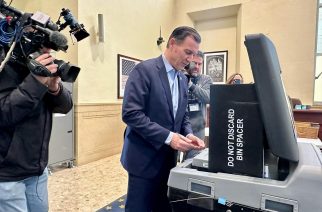 Gov. Andrew Cuomo announced last week that the New York State Department of Transportation and the Federal Railroad Administration successfully inspected crude oil tank cars and rails that transport oil across the state.
Gov. Andrew Cuomo announced last week that the New York State Department of Transportation and the Federal Railroad Administration successfully inspected crude oil tank cars and rails that transport oil across the state.
Inspection teams examined 215 crude oil tank cars, approximately 190 miles of track and 26 switches. They found and fixed four critical defects and 16 non-critical defects.
Critical defects are considered a problem that must be fixed immediately. All four of the critical defects were found on the track from Rome to Syracuse, including broken tread portions of switch transition devices and rails having not enough bolts.
Non-critical defects must be repaired within 30 days. Examples include loose guard rails, switch rod bolts and joint bars.
“Public safety is our number one priority and these crude oil rail inspections are part of our ongoing efforts to reduce the risk of potentially fatal accidents,” Cuomo said. “We will continue to work with our partners to enforce the toughest standards possible so that crude oil is transported safely throughout this state.”
Cuomo initiated track and train inspections in February 2014. Since then, state and federal investigators have examined 10,554 crude oil tank cars and 4345 miles of track, finding and addressing 1,585 defects in the process.
The safety of crude oil transport was called into question after a series of derailments and explosions, including the 2013 disaster in Lac-Mégantic, Quebec that left 47 people dead.
Because of technological advances in hydrofracking, North Dakota’s Bakken formation has been producing massive amounts of crude oil. According to a report from the U.S. Energy Information Administration, the Bakken region currently produces around 1.1 million barrels of crude oil a day, up from an estimated 400,000 just five years ago.
The oil originating in those fields is transported across the country by rail car, and Albany has become one of the industry’s biggest transportation hubs. Trains on their way through Canada or the Midwest stop in Albany before traveling to refineries on the East Coast.
Although New York state authorities cannot slow the pace of trains traveling through the state, as railroad commerce is controlled and regulated by the federal government, Cuomo has implemented many safety precautions in the last two years.
In January 2014, Cuomo issued an executive order urging federal agencies to upgrade tanker car and rail safety, as well as to submit a report detailing safety measures that could be taken to reduce risk of accidents. Cuomo increased the Oil Spill Fund cap to $40 million from $25 million and allowed for $2.1 million of the fund to be used each year to prevent incidents and be better prepared for them.









